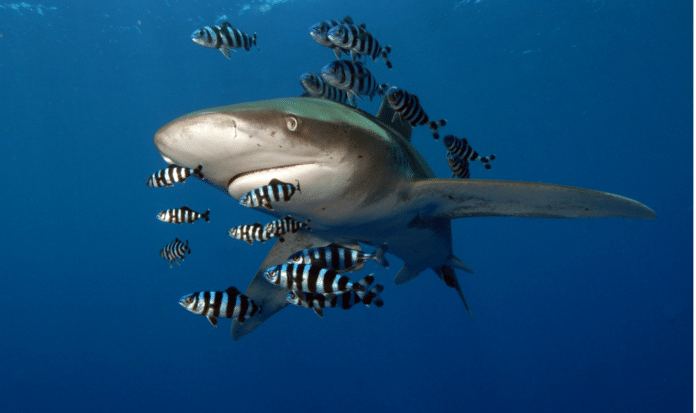The World Wildlife Fund is urging member states attending a meeting of the Western and Central Pacific Fisheries Commission (WCPFC) this week in Port Moresby, Papua New Guinea, to adopt new solutions to prevent the potential extinction of the oceanic whitetip shark and improve the plight of other sharks and rays harvested in the Pacific.
While oceanic whitetip sharks used to be the most common pelagic shark in the tropical oceans, that’s no longer the case. The population in the Western and Central Pacific has plummeted drastically due to overfishing or shark finning.
The latest scientific analysis commissioned by the WCPFC found that the whitetip shark population has declined by around 95%. The analysis also concluded that at current fishing levels, oceanic whitetip will go extinct in this part of the Pacific in the long term.
This level of decline would qualify the species in that region for the “Critically Endangered” category on the IUCN’s Red List of Threatened Species, meaning they would be only one step away from extinction in the wild.
If this top predator disappears, so will its role in regulating marine ecosystems — of which so much is yet to be discovered and understood. Their extinction in the Western and Central Pacific would also be a great loss for local Pacific cultures, where sharks hold a special place.
John Tanzer, oceans lead at WWF International, said:
“It is unbelievable that a species that could be counted in the millions in the past is now facing extinction in the Western and Central Pacific Ocean, an area covering almost 20% of the Earth’s surface. Urgent action is required to start rebuilding the oceanic whitetip population and to ensure that no other open ocean shark or ray ends up in such a disastrous position in the first place.”
The fact that overfishing for the oceanic whitetip is ongoing, in spite of an official catch and retention ban that has been in place since 2011, points to an inability to manage fishing impacts on this species, according to WWF.
WWF wants WCPFC member states to support the development of a recovery plan for the dangerously depleted population of the oceanic whitetip to prevent the species from going extinct. WWF is also urging leaders to finalize and then adopt a comprehensive conservation and management plan (CMM), including a “fins-naturally-attached” policy and catch quotas for all sharks and rays, to prevent other species from following the tragic trajectory of the oceanic whitetip.
Dr. Andy Cornish, Leader of WWF’s global shark and ray conservation program, said:
“With important decisions made by WCPFC only once a year and their consent-based decision-making process, it is of utmost importance that all member states take action at the upcoming meeting and agree to adopt the recommended, science-based measures. Only this way WCPFC will be able to conserve sharks – including the oceanic whitetip – and move fisheries towards a sustainable future.”
(Image credit: Elke Bojanowski / WWF-HK)

